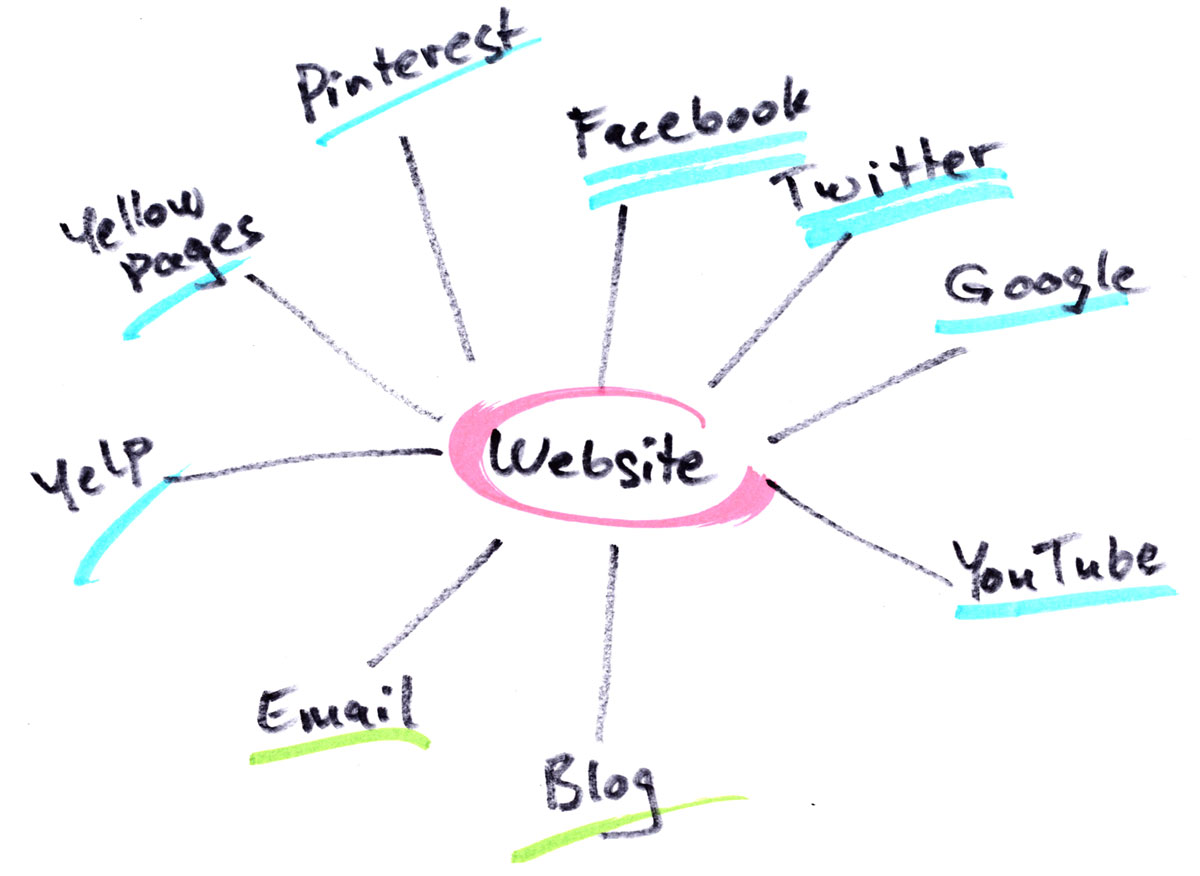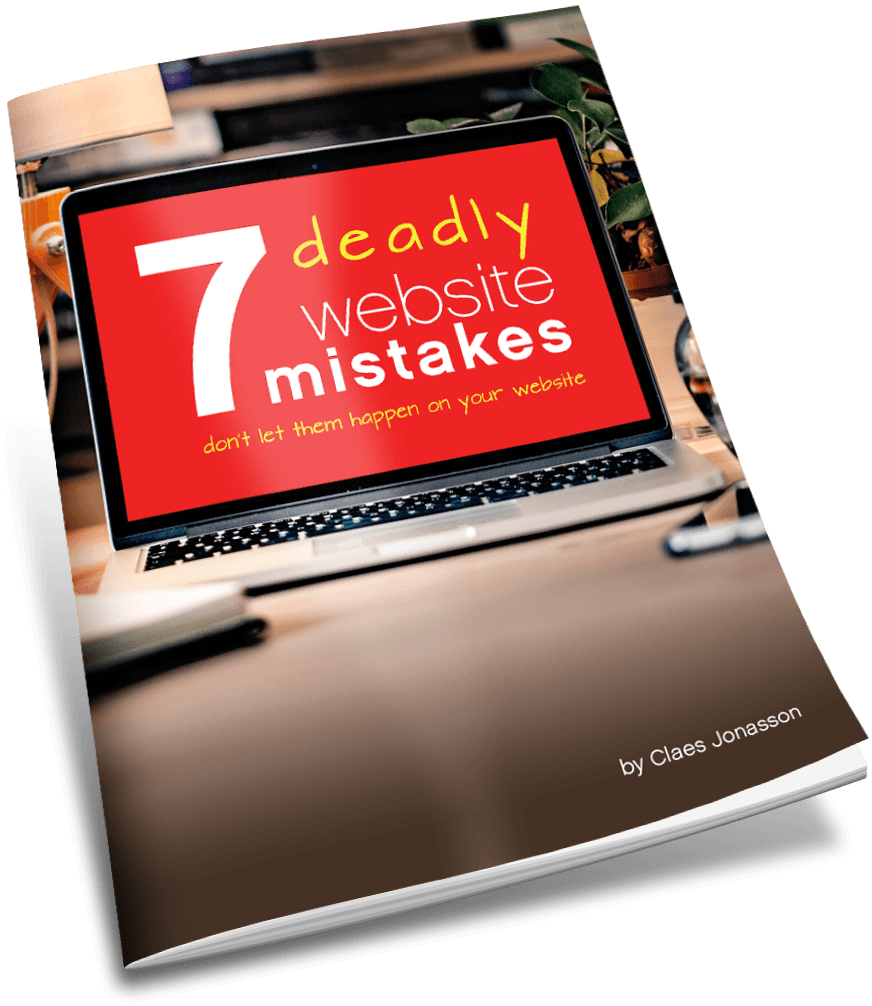I’m on social media — I don’t need a website, do I?
“In a couple years, websites are going to be history. It’ll all be about apps.” My friend was very convinced as he spoke those words.
In another conversation, a store owner told me how the sales rep for (insert one of several big online advertising/search companies here) told her that she needed to pay them to showcase all her store’s vital info, because “nobody goes to your actual website anymore”. Presumably they all go to his company’s curating solution instead.
Let’s be honest: Life hasn’t gotten any easier if you are a small business owner or non-profit trying to connect with your audience (customers, constituents — those interested in what you have to offer).
Once upon a time you hung up your shingle in front of a physical store on Main Street and you put an ad in the yellow pages of a physical phone book.
Done. People heard about you and knew how to find you.
Oh, you might also put an ad in the local newspaper from time to time.
Now you were really done. Just relax and wait for customers to show up.
Then the world changed
This internet thing came about.
So now you need a website, Facebook, Yellow Pages (online, does anybody actually use the paper version any more?), Google, Bing, Yelp, Pinterest, Twitter, Instagram and a bunch of other social media. (Many of them insist that they are the only one you really need.)
Oh, let’s not forget your very own app. Because what could be better than an app where your customers will connect directly with you?
First things first
It really helps if you know where your customers are online and in the real world. Because that’s where you should go to connect with them. Not where some account rep says you must spend money (HINT: Ask the rep how you will know if their solution works? What are the objective measurements? Be prepared for some squirming.)
The elephant in the room
What all too frequently gets ignored with all these ways of connecting with your customers is that they’re all rented space. Somebody else owns the platform and you are on there, subject to their terms (which are subject to change).
Google can (and does) change the search algorithms and what was in the page one results yesterday may be buried on page 89 tomorrow.
Facebook also frequently changes the rules or costs to reach your fans. So you may have a model that works awesomely for bringing in leads today. But tomorrow they change what shows up in people’s feeds and guess what, your stuff is not included nearly as often as it used to be!
These are real examples that can very much affect your bottom line.
Old world example: Mike was a successful insurance agent for Big Insurance Company (not their actual names). Lots of clients, doing well. Until the day when the BIC pulled the plug. All of a sudden his customers were being assigned to other insurance agents and since the entire contact list was in the BIC database, Mike had no customers. Except the ones he could remember contact details for. It was not pretty. The good news is that Mike survived and rebuilt his agency as an independent agent.
If you rely on an online platform like Facebook, Google, Yellow Pages, etc to connect with your customers, you could find yourself in Mike’s position overnight: shut out from your contacts.
Let’s say you have 10,000 likes or 1,000 fans on Facebook. Awesome. Now, if Facebook went away tomorrow, how would you connect with those people? (Not picking on Facebook — it’s just realizing that you don’t actually own those relationships when you’re renting a platform.)
Own it
So what is a platform you actually own and can control 100%?
Your website. You own it. Your domain. You’re not fighting random advertising on there. You are not the product. Your website is about you. It’s your story and you choose how you invite your visitors to connect with you.
Sure, you say. That’s all good and well if the customers ever get there.
Good point. That’s where all the other platforms come in. When you know your customers, you know where they spend time. So you show up there (Facebook, Twitter, Instagram, etc.), but the conversation doesn’t end there. Those services are used to attract visitors to your website.
Hub and spoke
 It’s a hub and spoke concept. Your website is the hub and everything else is spokes that lead back to your website. Once a visitor is there, you can connect with them and build trust in a way you won’t be able to in a casual visit on Facebook or Yelp.
It’s a hub and spoke concept. Your website is the hub and everything else is spokes that lead back to your website. Once a visitor is there, you can connect with them and build trust in a way you won’t be able to in a casual visit on Facebook or Yelp.
And when the online world changes again tomorrow, your website is still there.
In this strategy, your messaging on the spokes (all the various social media and search directories you’ve chosen to be part of) gives visitors a taste and invites them to your website to learn more or shop. It’s at your website that the deal is closed or the contact information is collected so you can keep in touch. Once somebody gives you their email address, phone number or physical address there, you can follow up and connect further, building a relationship.
The future
So what about the prediction that in a few years we won’t need websites, because it will all be about having an app?
None of us know the future. We can only guess, based on trends we see.
Consider this: An app can be a great solution for an engaged audience.
They have already connected well enough to give you shelf space on their mobile device by downloading your app. And when the time comes that they want to engage or look up something related to your organization or business, they may very well go first to your app.
But what about the person who just heard about you? How do they get the app they need to connect with you when they don’t know you exist? Do you expect them to choose to download the app and install it on their device so they can find out something about you and decide if they want more info? That’s a lot of thresholds to cross (=rather high entry barrier).
Some businesses/organizations try to do it both ways, so when I go to their website, they take me to their fully functional website, but also give me a gentle reminder that there is indeed an app available. Would I like to download it? First-time visitor — probably not. Regular visitor — maybe the app will be a good idea.
Bottom line
Build an online platform to connect with your audience. A website is central in that concept because that’s where you own the real estate and fully control the message. It’s your brand with no distractions.
Then use social media, search engines, directories and other tools to draw people to your website which is where you provide the real value for them. Make them want to come back, again and again.
When you have a website you’re proud of, you’ll find that there are many ways to get people there and get them to talk about it so their friends come check you out.
But it all starts with your very own website. Be the hub.
Questions:
Do you have a plan for how your website and social media integrate?
Are you intentional about what content you post where?
If I go to your website, is the content fresh and relevant, so I want to come back?
Never miss out!
Get an email update every time I publish new content. Be the first to know!

